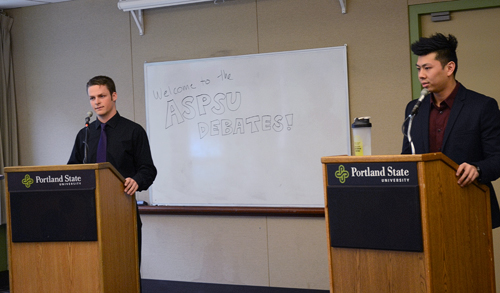Since announcing their candidacies last week, Harris Foster and James Au, the candidates for Portland State student body president, have run campaigns that appear to be devoid of the enmity of past election seasons.
ASPSU president debate highlights subtle differences

Since announcing their candidacies last week, Harris Foster and James Au, the candidates for Portland State student body president, have run campaigns that appear to be devoid of the enmity of past election seasons.
Campaigning on platforms that at first glance appear nearly identical—both propose to expand community outreach and engagement within the PSU community along with student government collaboration with university administration and state legislature—Foster and Au took the opportunity to differentiate their campaigns on Thursday. It was their only scheduled debate before voting begins on April 22.
At the debate, a 90-minute session moderated by the PSU Debate Union, Foster and Au discussed their philosophies on student government and gave insights into how each might lead next year.=
Foster, a junior French major, is running along with sophomore vice presidential candidate Yesenia Silva Hernandez. He presented a platform that focuses on continuing his work with the Associated Students of Portland State University as a senator. His goals are to to modify the university’s current contract with Higher One and to push for a Good Samaritan policy that would allow students to call 911 in cases of alcohol or drug overdose without the potential for incarceration.
Au, running with fellow senior business major Jay Phung, said he hopes to focus on advocating student causes rather than supporting any specific measures of personal interest.
One point on which the candidates had divergent ideas was the issue of how to manage ASPSU staff in a way that would prevent the divisiveness that marked the last election campaign. Both agreed that roles within student government should be made clearer, but differed in how they would address the situation.
“I plan to reinstate at least one training a month, so that people can have the resources that they need,” Foster said, adding that the training would be mandatory. Au said he preferred to focus on clarifying job descriptions and more individualized training tailored to specific learning styles.
The candidates hope to engage the campus community in different ways. Foster said that advertising the existence of ASPSU and the work it does for the campus community is the paramount goal, adding that he often talks to students on campus who are unaware of ASPSU. Au hopes to spread awareness by increasing the government’s community engagement and by using ASPSU resources for food and entertainment to incentivize students to come together at larger events in the Park Blocks and other venues.
During the debate, Au was asked about his role on the organizational budget council, whose misallocation of funds during the first two terms of the 2012–13 academic year led to budgetary shortfalls during the spring term, and how he would prevent this as president.
“We set policies that limit spending and set caps. This money is finite,” Au said, “so we need to set limits and make sure that people spend as smart as possible.”
The two candidates will make one final appearance at a meet-and-greet session on Wednesday from noon–3 p.m. in Smith Memorial Student Union, room 294, before the voting period closes on May 3.






